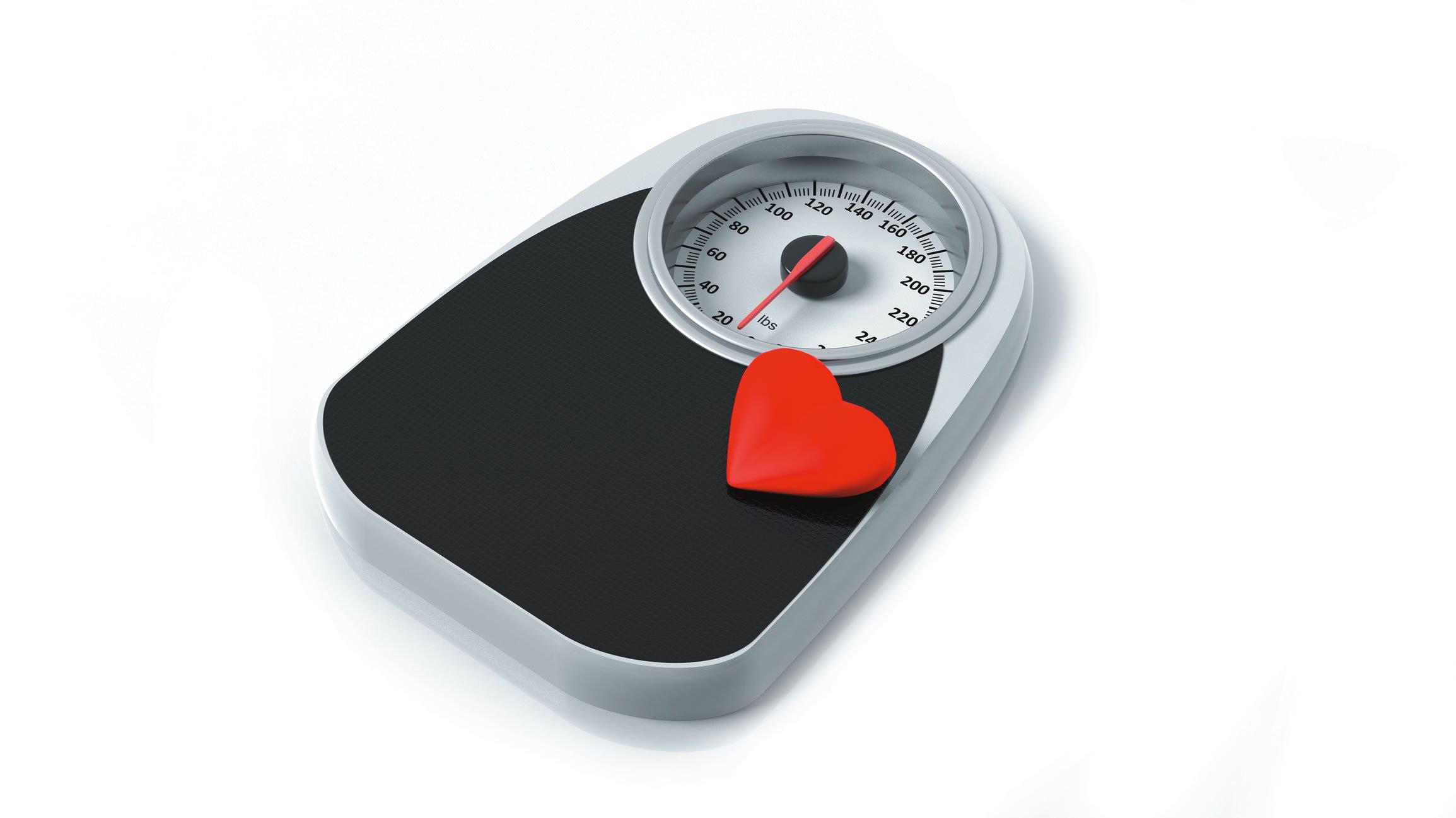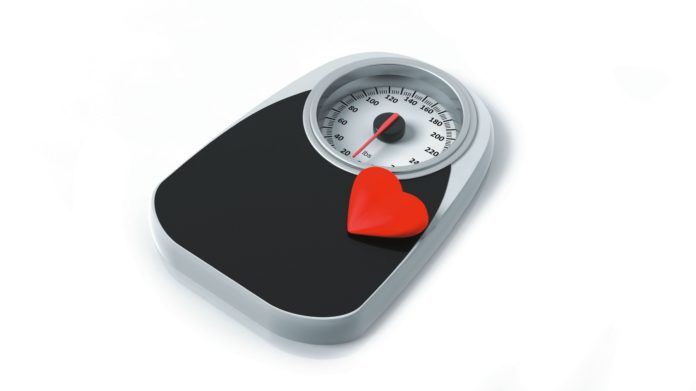Image © george tsartsianidis | Getty Images

Excess body weight increases risk for cardiovascular disease (CVD), as well as type 2 diabetes, certain cancers, and many other illnesses. However, not everyone who is overweight or obese develops these illnesses; and simply having a “normal” body weight or body mass index (BMI)-a measure of body weight relative to height-is no guarantee of low risk. “The relationship between BMI and risk for CVD and death is complex,” says Edward Saltzman, MD, academic dean for education at Tufts’ Friedman School of Nutrition Science and Policy. “Elevated BMI does increase CVD risk, but risk is also impacted by things like body-fat percentage, waist circumference, age, duration of obesity, race, ethnicity, gender, and other genetic factors,” as well as lifestyle elements such as smoking and level of physical activity.
Metabolic Health: Risk for CVD is closely tied to metabolic health. High blood pressure, low HDL cholesterol levels, elevated triglyceride levels, and high blood sugar are all indicators of metabolic abnormalities associated with increased risk of heart attack and stroke. The more of these metabolic risk factors a person has, the higher their CVD risk, no matter what they weigh. It is estimated that 65 to 80 percent of people with a BMI in the “obese” range (>30) have at least two common metabolic abnormalities, and a study published in European Heart Journal in March of 2018 found that only six percent of individuals with obesity had no metabolic problems at all. “While it is possible to be metabolically healthy at an elevated BMI,” says Saltzman, “there is still a strong association between BMI and metabolic health.”
One reason for the correlation between higher body weight and metabolic problems is that excess body fat is associated with chronic low-grade inflammation. This inflammation increases risk of insulin resistance, diabetes, and developing CVD. In 2017, the landmark CANTOS trial gave over 10,000 heart attack survivors with laboratory evidence of chronic inflammation a drug designed to lower that inflammation. The drug lowered the risk of future cardiovascular events, demonstrating that inflammation is an important, and modifiable, risk factor for CVD.
BMI and Cardiovascular Disease: The European study cited above, which included nearly 300,000 white adults, found that risk of high blood pressure, heart attack, and stroke each increase as BMI and waist size increase. Participants with a BMI in the normal range had the lowest risk of CVD. But having a normal body weight is no guarantee of good metabolic health. A July 2018 study of over 23,000 Chinese adults published in the journal Nutrition, Metabolism & Cardiovascular Disease found that normal weight individuals who have a high percentage of body fat are at increased risk for several cardiometabolic conditions including diabetes and high blood pressure.
What You Can Do: Fortunately, metabolic CVD risk factors (like blood pressure, HDL cholesterol levels, triglyceride levels, blood sugar, and inflammation) can be modified by diet and lifestyle changes and appropriate medical care. Although people with an elevated BMI are more likely to have metabolic risk factors and cardiovascular disease, people with a healthier diet pattern, greater activity, and higher fitness (ability to exercise vigorously) have much lower metabolic risk, regardless of their weight or BMI; and people with poor diets, sedentary lifestyle, and low fitness have much higher metabolic risk, even if lean. A 2017 study in Preventing Chronic Disease found that overweight or obese individuals who had healthy habits (being a non-smoker, only drinking alcohol in moderation, getting 30 minutes of exercise daily, and eating five or more servings of fruits and vegetables daily) had disease risk similar to their normal-weight peers. So help protect your heart by making healthy lifestyle choices, no matter what the scale says.
Having obesity increases risk for cardiovascular disease and other metabolic conditions such as type 2 diabetes, but a normal BMI also does not guarantee good heart health. Here are tips based on what we know to date about metabolic health and weight:
-Dont judge health by BMI alone. Metabolic parameters (such as blood pressure, blood sugar control, and HDL cholesterol levels) are more important to heart health than weight. Even if you have a normal-weight BMI, check your waist circumference. A measurement of more than 35 inches for women or 40 inches for men is associated with higher cardiovascular disease risk.
-Make healthy dietary choices. Aim for a dietary pattern rich in fruits, vegetables, nuts, beans, whole grains, seafood, yogurt, and plant-oils and low in refined grains and sweets. Dietary patterns that emphasize these foods are associated with cardiovascular health, and the fiber and other compounds they contain nourish your gut microbiota, which may also support cardiometabolic health.
-Get moving. There is strong evidence that being physically active has many health benefits, including reducing risk of excessive weight gain, and helping to avoid or manage high blood pressure and elevated blood glucose levels. Any activity helps, including gardening and walking.
-Avoid smoking. If you smoke, get help stopping.
-Watch alcohol intake. Cut back if you drink more than the recommended one drink per day for women and two for men.
-Work with your doctor. Medications can help to control metabolic problems when lifestyle changes are not enough.

























when I was at my best weight 158 pounds at 5′ 11″, running 120 miles/week, my triglycerides were > 2,000 and my plasma and urine milky. Statins brought hem down to 500, but I developed myopathy, weakness and an elevated CK. Eztimibe 10 mg q hs, 2 grams of fish oil twice/day, and becoming vegan brought my triglycerides down to 160-220, with an HDL of 35 and LDL of 52. However I can’t get my fish oil living in a developing country during the pandemic. I do have zeti. I now weigh 173 pounds, and walk 1.5 hours/day, and still a vegan. Any advice please.
Greetings, would it be possible list the references you are quoting in your newsletters? It would make it easier to find the sources to her statements. Thank you.
What if you never have been over weight, but succumb to some of those afflictions, anyway? This is a question I have asked innumerable times, but no one has an answer. Do you/
YOU REFER TO A HIGH BODY FAT % BUT DO NOT PROVIDE ANY PARAMETERS ON WHAT A HIGH RATE WOULD BE kEN MAYES
“people with a healthier diet pattern, greater activity, and higher fitness (ability to exercise vigorously) have much lower metabolic risk, REGARDLESS OF THEIR WEIGHT OR BMI; and people with poor diets, sedentary lifestyle, and low fitness have much higher metabolic risk, EVEN IF LEAN.”
So, it’s less about obesity than it is about behaviors? Maybe we should focus on that instead of promoting weight bias, especially since medical professionals/researchers have yet to find a way for more than 3-5% of people to maintain long-term weight loss. Weight cycling (and weight stigma/bias) is far more dangerous to health than maintaining a higher weight, yet we continue to promote weight loss as a cure to a plethora of issues without any sustainable way of maintaining weight loss long-term.